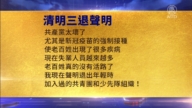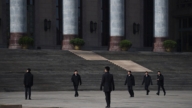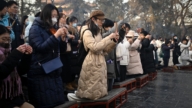【新唐人2013年11月05日訊】今年以來,中共城鎮化規劃、土地改革方案,以及上海自貿區金改細則等一再推遲發佈,再加上十八屆三中全會前夕,中共高調公布「383」改革方案,有分析認為,種種跡象表明﹕中央與權貴利益集團間的博弈已進入白熱化。
中共十八屆三中全會即將召開,中共總書記習近平11月2號表示,三中全會將提出綜合改革方案,就全面深化改革進行總體部署。
10月31號,中共總理李克強主持經濟形勢座談會時也強調,改革進入深水區,要敢於打破固有利益格局,循序漸進推進各項改革。
10月27號,中共還拋出了三中全會「383」改革方案,並高調公布新一輪所謂的改革「路線圖」。其中包括:行政管理體制改革、壟斷行業改革、土地制度改革、金融體系改革等八個重點改革領域。
英國《路透社》引述消息人士的話說,財政、土地和戶籍改革,都是中國城鎮化目標的要素,但這些關鍵方面仍有嚴重爭議,因中共內部仍存在分歧,同時還面臨來自國有壟斷企業等利益集團的阻力。
北京時政觀察人士華頗:「這些改革都是針對既得利益集團的,你說土改,那就斷了地方的財政,因為地方現在都靠賣地來掙錢,所以地方政府會拚命的反對﹔你金融改革,那些金融寡頭們就會激烈的反對。」
旅美原大陸史學教授劉因全也指出,農村戶口是束縛農民的枷鎖,戶籍制度不改革,中國農民沒辦法前進。
旅美原大陸史學教授劉因全:「農民問題、農業問題、土地問題,這些是中國共產黨的官員們得以剝削、盤剝這些最下層農民的一個手段,一個工具,如果單純改革這個方面的話,一定會遭到共產黨這些官員的……特別是一些既得利益集團的抵制和反對。」
華頗:「說白了現在就是你不改,窮人就會造反,你要是改了,既得利益集團那是就要拚命,所以它現在中央是在夾縫中求生存,它就是左右為難。」
9月6號,李克強在國務院常務會議上強調,儘快在金融、石油、電力、鐵路、電訊、資源開發和公用事業領域推出一些項目,引入民間資本投資,全面清理有關民間投資的法規,為民間投資「鬆綁開路」。
其實去年3月,溫家寶就曾提出,落實民間投資的新36條細則,因遭到利益集團狙擊,一直沒能落到實處。
目前中共高層分裂公開化、社會矛盾層出不窮、經濟也走到了崩潰的邊緣,中共政權隨時面臨崩塌的危機,習、李推行的城鎮化規劃、土地改革方案,以及上海自貿區金改細則等,因遭到阻撓,一再推遲發佈。
面對利益集團的阻撓,10月21號,李克強再次強調,「必須用壯士斷腕的決定來推進全面改革」。
10月7號,習近平也指出,改革是「難啃的硬骨頭」,涉及重大利益關係調整,改革已經進入攻堅期與深水區。
10月23號,習近平披露,將在三中全會上提出總體部署,處理好改革、發展與穩定三者之間的關係。
時政評論員汪北稷:「中國最大的問題不是由中央來制定改革的方法,去檢討甚麼改革阻力,或者吹這個風,哪個風,最大的方法是怎麼樣讓13億人不再成為政治上的奴隸,不再成為只能執行而不能去決策的人。」
時政評論員汪北稷指出,中共想在維護極權利益的前提下,保住社會穩定發展的局面,但這兩者互為矛盾,因為極權的狀態下,中共利益集團對國民經濟的劫持,對國家財富的掠奪就不可能杜絕。
採訪編輯/李韻 後製/陳建銘
Chinese Communist Regime Reforms Encounter Internal Party Conflict
There have been repeated delays in the Chinese regimes
plans for urbanization, land reform, and publication of the
Shanghai Pilot Free Trade Zone’s financial reform rules.
The State Council recently submitted the 383
reform plan to the 18th Central Committee,
ahead of the coming third plenary session.
These signs are thought to indicate escalating internal
struggles between the central leadership, and interest groups.
The Chinese Communist Party (CCP) General
Secretary Xi Jinping spoke out on November 2.
A comprehensive reform proposal will be deployed during
the Third Plenary Session of the 18th Central Committee.
CCP Premier Li Keqiang also spoke of reform
during an economic forum on October 31.
He stated that reform has stepped into deeper waters,
and takes courage to break the inherent interests,
and push forward the reforms gradually and orderly.
The “383 plan" was published on October 27,
with a blueprint of eight key sectors for reform.
They include administrative reforms, reforming state- owned
enterprises, land reforms, as well as financial sector reforms.
Sources spoke to Reuters about these reforms.
As much as reform is needed in the financial sector, land,
and housing registries for rural urbanization, much of the
reform agenda is still a matter of heated internal debate.
There is also resistance from interest
groups, such as state-owned monopolies.
Hua Po, Beijing political observer: “These
reforms are aimed at the interest groups.
Land reforms will cut off local government finances, so local
governments oppose it, because they profit from selling land.
Financial reforms will also meet with
opposition from those finance kings."
Chinese history expert Liu Yinquan, indicates that the
housing registry has restricted movement of farmers.
Liu Yinquan: “Farmers, agriculture and land are the tools within
the grassroots of society, which the CCP officials exploit.
Land reform itself will certainly meet with resistance from
these officials, and particularly the vested interest groups."
Hua Po: “To put it straight, without reforms, the poor will
revolt. With reforms, the vested interest groups will fight.
The regime is now facing a dilemma
for it’s very survival within this conflict."
Li Keqiang spoke on September 6 in
a State Council executive meeting.
He addressed the need to push plans for
the introduction of private capital investment.
He also highlighted rules for the financial sector,
oil, electricity, railways, telecommunications,
resource development, and public utilities.
Wen Jiabao proposed “36 private
investment rules" in March last year.
This was never realized, because
of resistance from interest groups.
The CCP leadership split has been revealed,
and the regime is on a potential brink of collapse.
It is facing a troubled society and economy.
Xi and Li’s reform plans for urbanization, land, and the
Shanghai Free Trade Zone have been challenged and delayed.
Facing these obstacles from the interest groups,
Li stressed again on October 21 for the need for
determination to promote comprehensive reform.
Xi had previously spoken on October 7, describing
the reforms as being like a bone that is hard to chew.
This is because it involves readjustment of interests,
and the reforms have entered a crucial state.
On October 23, Xi Jinping said that a deployment of reforms
will be dealt with during the Third Plenary Session, to ensure
a balance between the reforms, development and stability.
Wang Beiji, political commentator: “China’s biggest problem
is not about a reform plan, or the resistance of a reform plan.
It is about the need for freedom for the 1.3 Billion people, who
are political slaves, and to let them be the decision-makers."
Wang Beiji indicates the contradictory nature of the CCP
regime, in order to maintain stability under it’s totalitarianism.
In this totalitarian state, it is impossible to prevent these interest
groups from hijacking wealth from the nation, and it’s people.
Interview & Edit / Lee Yun Post-production /


























